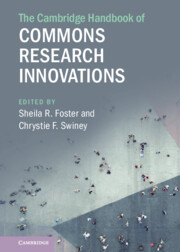Book contents
- The Cambridge Handbook of Commons Research Innovations
- The Cambridge Handbook of Commons Research Innovations
- Copyright page
- Contents
- Figures
- Tables
- Contributors
- Introduction
- Part I Revisiting the Origins and Evolution of Commons Thought
- Part II Averting New Tragedies
- Part III New Forms of Contested Commons
- Part IV Urban Landscape and Infrastructure as a Commons
- Part V Reassessing Old and New Institutions for Collective Action
- Part VI Managing and Restoring the Commons
- Part VII Law, Legal Theory, and the Commons
- 21 Prior Appropriation as a Response to the Tragedy of the Commons
- 22 Using the Public Trust Doctrine to Manage Property on the Moon
- 23 A Biotechnology “Regulatory Commons” Problem
- 24 Can Affirmative Action Offer a Lesson in Fighting Enclosure?
- Part VIII Technology, the Internet, and the Future of Commons Governance
- Index
22 - Using the Public Trust Doctrine to Manage Property on the Moon
from Part VII - Law, Legal Theory, and the Commons
Published online by Cambridge University Press: 29 October 2021
- The Cambridge Handbook of Commons Research Innovations
- The Cambridge Handbook of Commons Research Innovations
- Copyright page
- Contents
- Figures
- Tables
- Contributors
- Introduction
- Part I Revisiting the Origins and Evolution of Commons Thought
- Part II Averting New Tragedies
- Part III New Forms of Contested Commons
- Part IV Urban Landscape and Infrastructure as a Commons
- Part V Reassessing Old and New Institutions for Collective Action
- Part VI Managing and Restoring the Commons
- Part VII Law, Legal Theory, and the Commons
- 21 Prior Appropriation as a Response to the Tragedy of the Commons
- 22 Using the Public Trust Doctrine to Manage Property on the Moon
- 23 A Biotechnology “Regulatory Commons” Problem
- 24 Can Affirmative Action Offer a Lesson in Fighting Enclosure?
- Part VIII Technology, the Internet, and the Future of Commons Governance
- Index
Summary
The space race is underway. Satellites are filling up space, causing electromagnetic interference and dangerous debris from collisions and earlier launches. The lack of a meaningful global management system for private commercial development of outer space will allow these near space problems to be exported further into the galaxy.
The 1960s space treaties intoned that space should be developed for the benefit of all mankind and banned private ownership and militarization of space resources. Private companies, who would be absorbing the risks and high costs of outer space development, oppose any management scenario enabling less developed countries to free ride on their investments, and support privatizing outer space. But using private property-based rules would transport Earth’s current division between haves and have-nots into outer space and could lead to destabilizing hostilities.
Property owned in common could allow the equitable use of commons’ resources, while preventing their destruction or hostile disputes over entitlements to them. But a commons approach might allow the resource to be over-used or inequitably distributed. While the public trust doctrine may lessen those risks, the doctrine will require modification to incentivize space development. This paper suggests supplementing the doctrine with private property management tools, like tradable development rights.
- Type
- Chapter
- Information
- The Cambridge Handbook of Commons Research Innovations , pp. 264 - 272Publisher: Cambridge University PressPrint publication year: 2021



